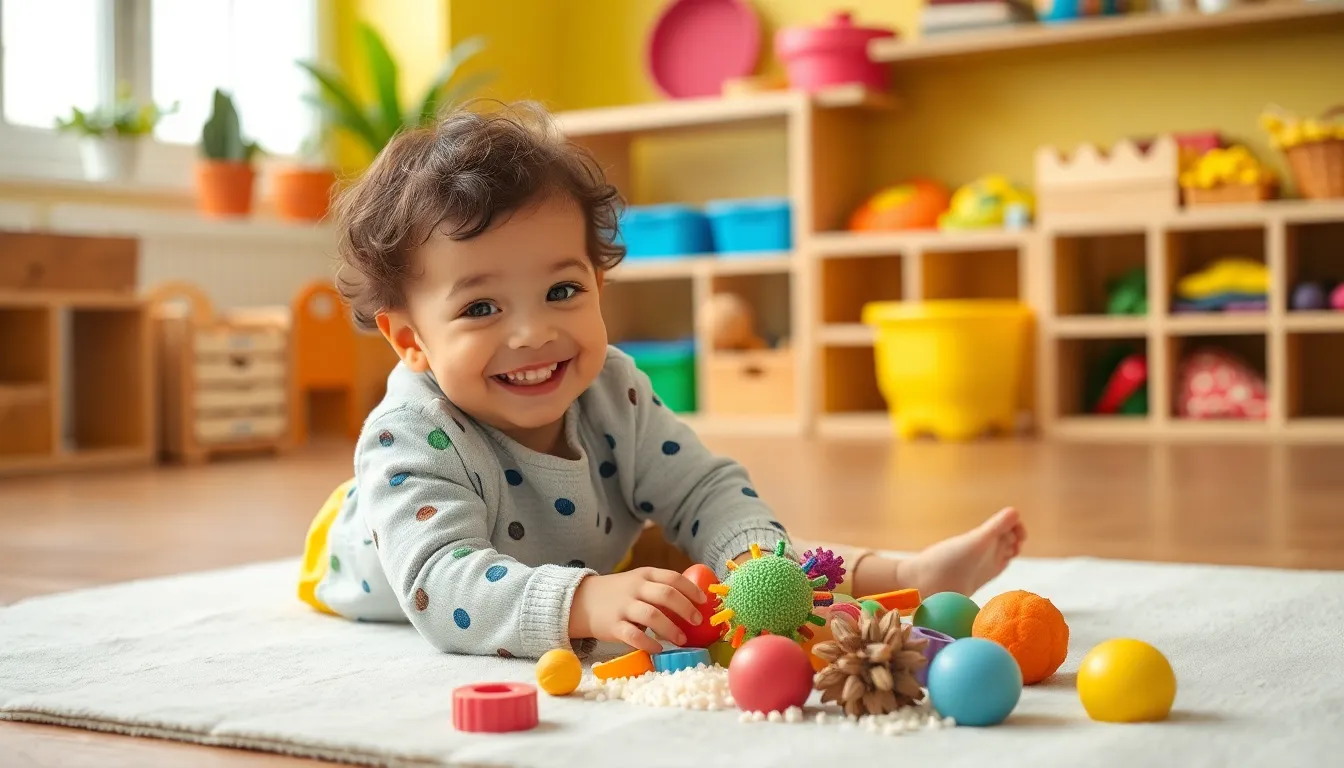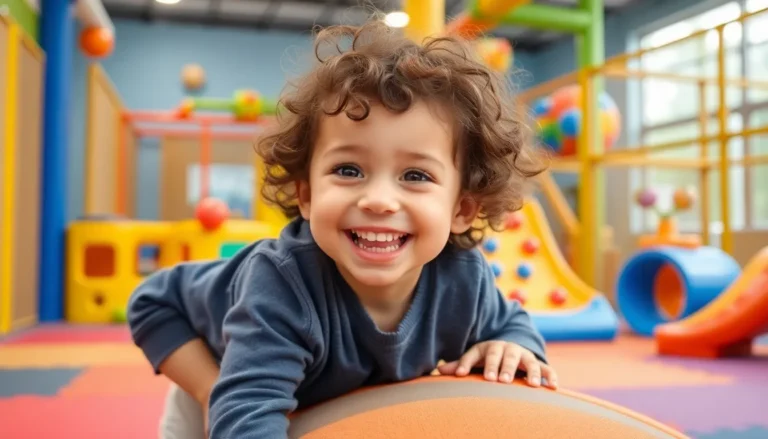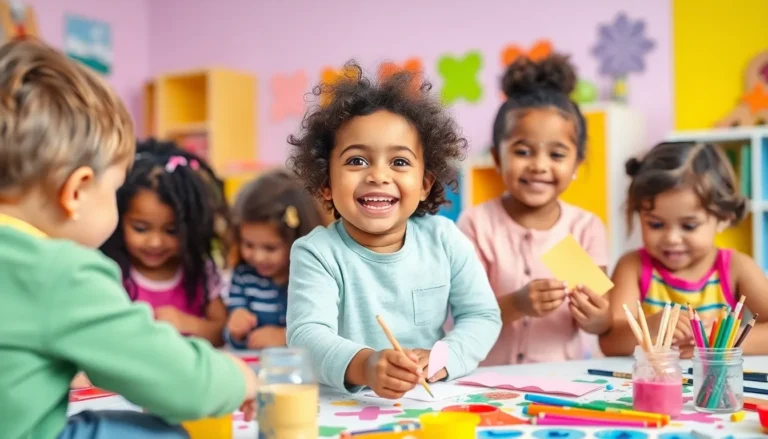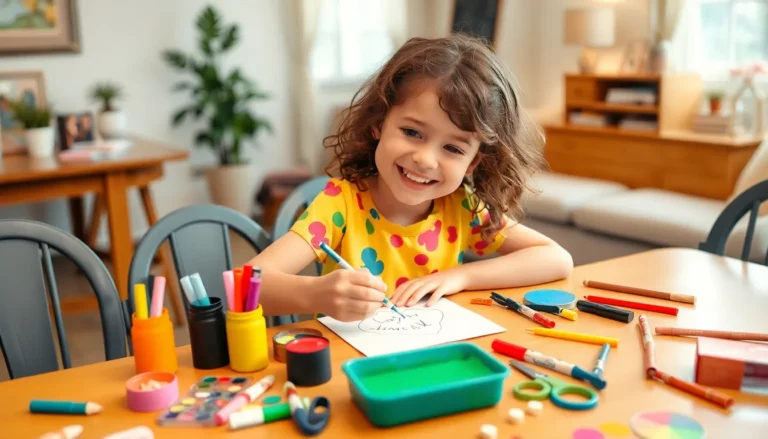Navigating the world of parenting is like trying to assemble furniture without the instructions. One moment you’re marveling at your little one’s first steps, and the next, you’re wondering how to keep them engaged and learning. Fear not! Educational activities for 1-year-olds are not only essential for their development but can also be a blast for both parent and child.
Educational Activities For 1 Year Olds
Educational activities play a vital role in the development of 1-year-olds. These activities stimulate cognitive growth, enhance motor skills, and encourage social interaction. Engaging in structured learning helps toddlers build foundational skills critical for future learning.
Communication skills begin to develop through educational activities. By participating in talking games and reading sessions, toddlers expand their vocabulary and improve comprehension. Language-rich activities facilitate essential listening skills.
Physical development occurs when children engage in hands-on activities. Simple tasks like stacking blocks or playing with shape sorters strengthen fine motor skills. Activities that incorporate movement, such as dancing or crawling games, further enhance physical coordination.
Social skills emerge during group activities. Interacting with peers encourages sharing and cooperation. Learning to navigate social situations sets the groundwork for emotional intelligence and relationship-building in later years.
Creativity flourishes through arts and crafts. Simple coloring or finger painting allows toddlers to express emotions while developing hand-eye coordination. Such creative outlets foster imaginative thinking.
Routine incorporation of educational activities offers additional benefits. Establishing a consistent schedule provides familiarity, helping children feel secure. Repetition promotes skill mastery, making learning enjoyable and effective.
Monitoring progress during educational activities is essential. Observing a child’s reactions informs parents about their interests and developmental stages. Adjusting activities according to their preferences aids engagement and learning outcomes.
Ultimately, the impact of educational activities for 1-year-olds extends beyond immediate benefits. Long-term effects include improved academic performance and enhanced life skills. Prioritizing these activities leads to healthier and more well-rounded development.
Types Of Educational Activities For 1 Year Olds

Educational activities for 1-year-olds cover a variety of engaging experiences that promote growth. Parents can choose from sensory play or music and movement activities to facilitate development.
Sensory Play Activities
Sensory play activities stimulate exploration through touch, sight, sound, and taste. Parents can introduce textured toys, water play, or soft materials like fabric and foam. Offering items with different colors catches attention while teaching colors and shapes. Messy play using safe substances like playdough helps develop fine motor skills. Simple activities, such as filling and emptying containers, enhance cognitive abilities. Sensory bins packed with rice or pasta provide further avenues for exploration. Children gain valuable experiences while participating in these interactive activities.
Music And Movement Activities
Music and movement activities encourage gross motor skills and coordination. Dancing to nursery rhymes allows children to express themselves through rhythm and motion. Singing simple songs reinforces language skills while promoting social interaction. Using instruments like shakers or tambourines introduces sound recognition and creativity. Playing catch with soft balls develops hand-eye coordination. Frequent opportunities for movement enhance balance and confidence. Structured music activities lay the groundwork for a lifelong love of music and physical activity.
Interactive Learning Experiences
Engaging 1-year-olds in interactive learning experiences fosters essential development. These experiences provide opportunities for exploration and creativity.
Storytime And Reading Activities
Storytime offers a wonderful way to introduce language concepts. Engaging books with colorful illustrations capture a child’s attention. Reading aloud enhances vocabulary and comprehension. Simple rhymes and repetitive phrases reinforce language skills. Parents can choose board books or fabric books specifically designed for young children. Encouraging children to point at pictures promotes recognition and interaction. These storytime sessions create bonding moments, stimulating affection and curiosity.
Simple Art Projects
Simple art projects stimulate creativity and fine motor skills. Providing safe materials like crayons, finger paints, and paper allows for exploration. Encouraging children to make marks improves hand-eye coordination. Activities like sponge painting or using stickers foster sensory experiences. Parents can lead short projects that prioritize process over product. Sharing compliments about their creations boosts confidence. Simple art projects ultimately create lasting memories while enhancing cognitive skills.
Tips For Engaging 1 Year Olds In Learning
Creating a stimulating environment is crucial for engaging 1-year-olds in learning. Prioritize sensory activities that promote exploration through touch and sight. Items like textured toys and safe water play equipment capture their interest, enhancing cognitive development.
Incorporating music is also effective. Singing songs encourages movement and expression, helping improve gross motor skills. Playful rhythms create a fun atmosphere that facilitates language reinforcement and social interaction.
Offering interactive play enhances learning experiences significantly. Simple art projects allow toddlers to experiment with colors and shapes using safe materials like crayons. These projects stimulate creativity, improve fine motor skills, and foster bonding between parent and child.
Using familiar routines helps toddlers anticipate activities, making them feel secure. Establishing a daily pattern, such as designated storytime, introduces language concepts consistently. Engaging books hold attention while expanding vocabulary and comprehension naturally.
Participating together in group activities fosters social skills early on. Sharing and cooperative play with peers teach important lessons in teamwork. Games that involve passing a ball or simple turn-taking activities further enrich their learning experience.
Monitoring a child’s progress provides valuable insights into their interests. Tailoring activities to what captivates them results in higher engagement levels. Customizing learning experiences also nurtures a sense of achievement and boosts confidence.
Encouraging exploration within safe boundaries supports developmental growth. Provide opportunities for toddlers to experiment with different materials, promoting their curiosity and problem-solving skills. Each of these tips enhances overall learning outcomes, paving the way for future educational success.
Conclusion
Engaging 1-year-olds in educational activities lays a strong foundation for their future growth. These activities not only foster cognitive and motor skill development but also encourage social interaction and creativity. By prioritizing play-based learning experiences parents can create a nurturing environment that promotes exploration and discovery.
Establishing routines helps toddlers feel secure while also enhancing their ability to learn and master new skills. Tailoring activities to a child’s interests keeps them engaged and motivated. Ultimately the joy of learning during this crucial stage sets the stage for lifelong curiosity and academic success.




